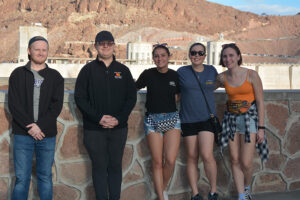Students Spend Spring Break Learning the Mathematics of Vegas
March 23, 2022

Left to right: Dr. Mark Bollman; Grace Hoffman, ’22; Quinlan O’Keefe, ’23; Devon Funk, ’22; Maddy Peterson, ’22; Grace Cholette, ’23; and Dr. Darren Mason.
By Ariel Berry
Over spring break, five intrepid math students and three chaperones journeyed to Las Vegas for the week.
The trip was part of MATH 257: Mathematics of the Gaming Industry—a class that student Quin O’Keefe, ’23, says, teaches “the math behind the games, to see if the game favors you or if it favors the house.”
Although the course dives deep into the math behind the games, it also teaches students “how to gamble better, and some of the strategies that will make your odds better of winning,” says O’Keefe.
O’Keefe is a mathematics and Spanish double major with a secondary education concentration. “Pretty much our entire trip was dedicated to us putting our skills to the test, using our own money to play these different games from what we’ve learned in class,” he says.
Evolution of a Course
The instructor of the class, professor of mathematics Dr. Mark Bollman, says the goal of the trip was to give the students “a chance to try out what they’ve been learning in class. We practice the games in class, but you can’t simulate the experience of losing money or winning money in the classroom,” he says. “All the chips come back to me at the end of the hour, we box them up, we put them away. You don’t have the same exposure to risk that you get when there’s real money on the line.”
The idea for the trip, which has now taken place four times, came from a student. Bollman first started teaching the math behind casino games in a First-Year Seminar, and then later as a course in the Prentiss M. Brown Honors Program. He took his honors students to a casino (which had a legal gambling age of 18) to try out their skills.
“One of my honors students said, ‘Hey, we should go to Las Vegas.’” Bollman says. “And I said, ‘Yeah, check back with me when you’re 21.’ Well, she did.” And so the Vegas trip, and accompanying Mathematics and Computer Science Department class (for students 21 and over, and able to legally gamble in Vegas), was born.
Students were made aware that travel to Nevada was not a requirement for the course. For those who were interested in traveling, a Department fundraising effort last fall—supported primarily but not exclusively by math alumni—enabled the Department to cover lodging, meals and outings. Students paid for their own airfare and any gambling they chose to do.
When they got off the plane, “Mark Bollman’s advice was stick to something you know the rules of; don’t play something you don’t know how to play,” says economics major and applied math minor Grace Cholette, ’23. Bollman gave the students strategy cards for playing blackjack. “I did blackjack twice while I was there, and I doubled my money the first time, and I won $2 the second time, so that was really nice for me, just by using the strategy card,” Cholette says.

At Hoover Dam, left to right: Funk, O’Keefe, Cholette, Hoffman and Peterson.
O’Keefe says Bollman “gave us a lot of great advice. The main lesson was knowing when to walk away from the casino tables. Knowing how to set yourself to a limit and knowing when to stop. Knowing that when you win money that you shouldn’t keep going. You should just walk away when you win.”
This strategy panned out for O’Keefe. “I came out $60 to $70 positive,” he says. “But the course deepened further my understanding of casino games as I previously learned them. And then, learning the math was an essential part of how playing these different games can affect your odds of winning or losing.”
Cholette took Bollman’s advice to heart on the trip as well. “We had a good system where we’d be like, ‘OK, we’re cutting you off,’” she says. When she and her classmates won big, they made sure to cash out before losing it all.
Serious Math
Bollman has been studying the math behind casino games for years now, and has written four books on the subject; the most recent one, published in August 2021, is titled Mathematics of the Big Four Casino Table Games (CRC Press). “It’s about baccarat, blackjack, roulette and craps. Those are the ones you’re going to find in any casino that’s got table games,” Bollman says.
It may be a fun topic, but the book discusses serious math. “This takes a deep dive into the math that goes into those games,” Bollman says. “I talk a lot about variations; I talk about, ‘How does this change in the rules affect the game for the players?’”
In the end, it’s all about the math. “Any casino game is going to be founded in mathematics, and for the last decade or so that’s been my area of research,” Bollman says. In fact, his first book was inspired by the need for a textbook for a class he was teaching. “I had a hard time finding a good math book for that class,” Bollman says. “I went through a lot of different books and it was not easy to find one that covered the math that I wanted without doing a lot of math that I didn’t want.”
The challenge was to find a book that was accessible to beginners, but complex enough to really dig into the technical aspects of some of the math. “I didn’t want to be too advanced, but at the same time I wanted some things that were not in an elementary statistics book,” Bollman says. “So I couldn’t really find a good book, went through several, and finally I just said, ‘I’ve got to write my own,’ and that was the first book.”
Bollman is happy with the results of that first book. “It’s kind of been the math book I was looking for,” he says. “And then there was two years of research that went into writing that book, and I just kept looking into gambling stuff and finding new games and finding new problems. And then there came a point when I realized, ‘Oh, this is enough for another book.’ That’s how books two, three and four came about.”
Because of the shift in research focus and emphasis on gambling math in Bollman’s classes that the first book caused, “the first book is really the foundation for this Vegas class,” he says.
What does Bollman hope readers will get out of his books? “The cheap and easy response is I hope they will learn not to gamble,” he says, “because it lays out why casinos have an advantage. The rules of the games are set to give the casino the edge. The line I use is, ‘Las Vegas doesn’t pay for all of its neon by giving away lots of money.’
“So, on some level, an ideal outcome would be that people don’t gamble, but people find entertainment value in gambling,” Bollman continues. “I don’t want to discourage them completely, so perhaps a more reasonable outcome would be that they can gamble responsibly. People who read my books know where the good games are and know the games to avoid.”
For someone who has dedicated a decade of his life to gambling math, this answer may be surprising. But for Bollman, it’s really always been about the math. He views casino games through the knowledgeable eyes of someone who has seen the inner workings and knows when the deck is stacked against him.
O’Keefe says the MATH 257 class really drove home “how much math has to play in the role of casino games.” Despite their risk, as Bollman details, casino games still maintain a certain draw. Adds O’Keefe: “When I found out Dr. Bollman was offering the class this semester, I had to take it. How could I not?”